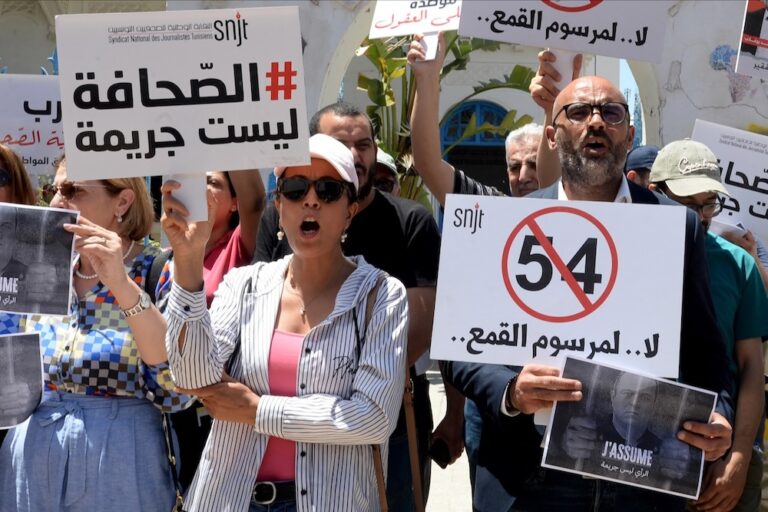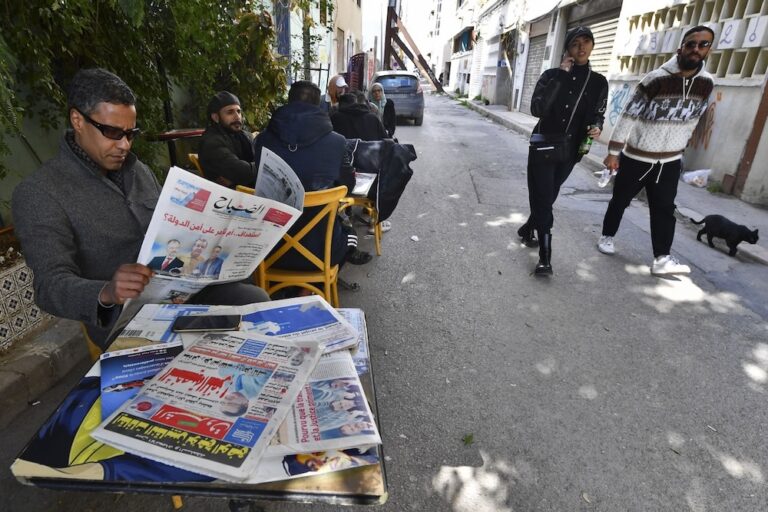The constitution could violate the right to freedom of expression. Provisions in the constitution to protect "sacred values" are worrying and plans for media freedom are woefully inadequate and must be changed.
(ARTICLE 19/IFEX) – Tunis, November 8, 2012 – ARTICLE 19 warns that the initial draft of the Tunisian constitution fails to protect fundamental human rights as it publishes a new report on the draft constitution. Better formulated and more precise provisions are needed in particular to prevent against the possibility that the constitution could violate the right to freedom of expression. Provisions in the constitution to protect ‘sacred values’ are worrying and plans for media freedom are woefully inadequate and must be changed.
The report, which presents a thorough legal analysis of the draft constitution, has been published to coincide with crucial discussions in Tunisia about the legal framework upon which the new Tunisian regime will be built. ARTICLE 19 calls on the National Constituent Assembly (ANC), the body in charge of devising a new Tunisian constitution, to ensure that freedom of expression and all fundamental human rights are given protection that is in line with international standards.
“At the moment some parts of the draft constitution contradict very basic international standards on human rights. In particular, real care needs to be taken to make sure that the crucial right to freedom of expression is properly protected. Freedom of expression is vital for democracy, it is the right which allows people to voice their concerns and to take an active role in shaping the society and the state that they live in,” said Agnes Callamard, ARTICLE 19’s Executive Director.
“The ANC must make sure that the constitution protects freedom basic human rights, which includes the right to freedom of expression. One hundred and fifty years ago, Tunisia was a pioneer – drafting the first constitution in the Arab world. We now stand at the threshold of a new opportunity. Tunisia can once again be a pioneer and create a constitution which gives the people of Tunisia a truly democratic future and sets an example for others in the region and beyond,” she added.
The areas of the constitution which present the biggest cause for concern because they violate international standards and must to be changed are:
Media regulation: The proposals for the regulation of the media do not meet international standards. All regulatory powers over the media, including the governing bodies of public media, must have guaranteed independence. Failure to do this could see control and censorship of the Media in the new Tunisia.
Sacred values: The draft constitution provides protection for sacred values and makes violation of these sacred values a criminal offence. What are sacred values? Who determines them and how? What constitutes a violation? There is a real danger that this element of the constitution could allow for censorship of legitimate free expression. Sacred values must be removed from the constitution.
Women: The draft refers to women being in partnership (“complementarity”) with men, rather than recognising gender equality between men and women. The constitution must be clear that women have full equality with men.
International Treaties: The draft does not clearly recognise that when an international treaty had been ratified or approved it will become binding in domestic law. This violates the Vienna Convention on Treaties. International treaties must be binding and states must uphold commitments they have made.
“It’s very difficult to find common ground amongst so many different and competing views and where we continue to see violent social unrest on the streets. We have to acknowledge the ANC’s efforts to achieve consensus. There is some good work which has gone into the draft constitution, but we must be clear – the Tunisian constitution must protect basic human rights and safeguard freedom of expression. More still needs to be done,” said Agnes Callamard, ARTICLE 19’s Executive Director.
ARTICLE 19 urges the National Constituent Assembly to make significant changes to the draft constitution to bring it in line with international standards on human rights.
Click here for ARTICLE 19’s 10-point plan for the minimum changes the ANC need to make.
The ANC must listen to human rights activists in Tunisia and abroad in order to build a constitution that will best serve all Tunisian people. The violence that continues to blight Tunisia demonstrates the need to protect the human rights of all people including their right to free expression.


